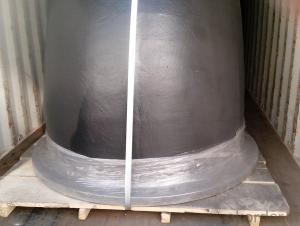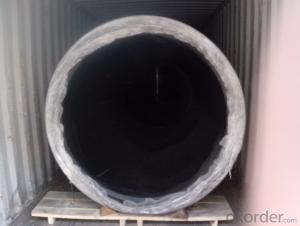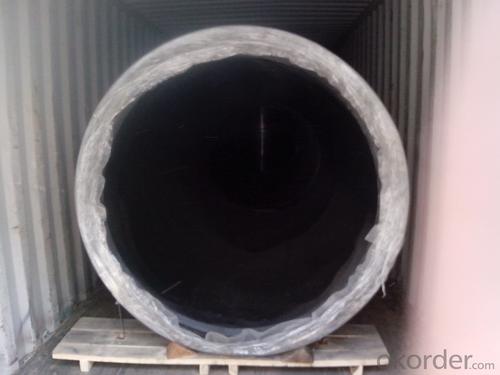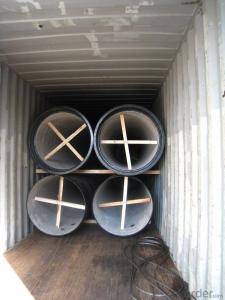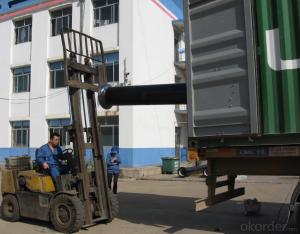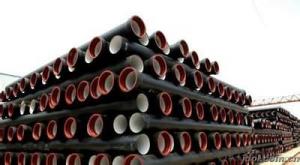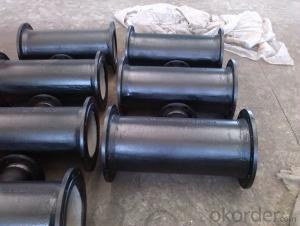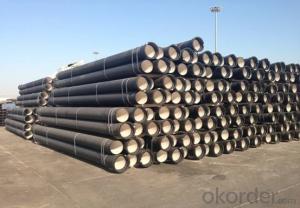DUCTILE IRON PIPE C Class DN 1000
- Loading Port:
- Tianjin
- Payment Terms:
- TT OR LC
- Min Order Qty:
- -
- Supply Capability:
- 30000Tons m/month
OKorder Service Pledge
OKorder Financial Service
You Might Also Like
CNBM ductile iron pipe ranges from DN80-DN1600mm (T-Type, Class K9), effective length 6m, comply with ISO2531 Standard
Company Profile
CNBM International Corporation is the leading production base and renowned supplier of Ductile Iron Water Pipe systems of both potable and waste water in China. We are constantly looking to develop high quality products to ensure the longest service life and wonderful performance.
CNBM Pipelines regard quality as the essential factor leading to successful business. Every pipe is tested in accordance with BS EN545 (water application) or BS EN598 (sewer application). CNBM Pipelines products comply with and are tested according to the relevant European and International Standards. Our pipes are manufactured under the quality management system BS EN ISO 9001. After years of efforts, CNBM Pipelines has built up great reputation in terms of quality and service among customers worldwide
Product Introduction
CNBM ductile iron pipe ranges from DN80-DN1600mm (Tyton, T-Type, Class K7/K8/K9), effective length: 6m, complying with BS EN545/EN598/ISO2531/BS4772.
Specification& Payment terms
Internal lining: Pipes shall have an internal cement mortar lining in acc with ISO4179.
External coating: Pipes shall be externally coated with metallic zinc spray plus a further layer of resin painting to ISO8179.
Gasket: 100% SBR/NBR/EPDM gasket in accordance with ISO4633.
Packing: Pipes from DN100 to DN300 be bundled with steel belts, the others are in bulk.
Payment term: By 30% T/T advance payment + 70% Irrevocable L/C at sight.
Packing: In bulk vessel or in container.
- Q: What are the common methods for cutting ductile iron pipes?
- Cutting ductile iron pipes can be done using various methods, depending on the specific requirements and available tools. 1. For smaller diameter pipes, a hand saw with a carbide-tipped blade is commonly used. However, this method requires physical effort and can be time-consuming. 2. A more efficient option is using a reciprocating saw with a diamond or carbide abrasive blade. This power tool allows for faster cutting and requires less physical effort. 3. Another popular method is using a cut-off saw, also known as a chop saw or disc cutter. Equipped with a diamond or abrasive blade, this power tool provides precise and fast cuts, making it suitable for both small and large diameter pipes. 4. Cutting larger diameter ductile iron pipes can be achieved using a band saw with a bi-metal or carbide-tipped blade. This method allows for clean and precise cuts, but it may require specialized equipment and expertise. 5. In cases where other cutting tools are not available, a grinding wheel with a diamond or abrasive disc can be used for cutting smaller diameter pipes. It is crucial to follow proper safety precautions when cutting ductile iron pipes. This includes wearing appropriate protective gear and using clamps or vices to secure the pipe during cutting. It is also recommended to consult professionals or refer to manufacturers' guidelines for specific recommendations on cutting ductile iron pipes.
- Q: How do ductile iron pipes handle dynamic loads?
- Ductile iron pipes possess remarkable strength and durability, enabling them to effectively manage dynamic loads. These pipes exhibit a high resistance to bending and can endure the pressure and stress exerted on them when exposed to dynamic loads, such as water hammer or ground movement. The distinctive composition of ductile iron, which includes a small amount of carbon and the addition of magnesium, produces a structure that is both robust and flexible. This combination allows the pipes to flex when impacted by dynamic loads, rather than fracturing or breaking like other materials. Moreover, ductile iron pipes demonstrate a superior impact resistance, enabling them to absorb and distribute the energy generated by dynamic loads throughout their structure. This capability to dissipate energy effectively minimizes the risk of pipe failure and ensures the longevity of the pipeline system. Additionally, ductile iron pipes exhibit excellent stress distribution properties, ensuring that the load applied to the pipes is evenly dispersed along their length. This feature serves to prevent localized stress concentrations and reduces the likelihood of damage or failure. To summarize, ductile iron pipes are specially designed to handle dynamic loads with utmost efficiency. Their strength, flexibility, impact resistance, and stress distribution properties make them highly suitable for applications where dynamic loads are a concern, guaranteeing the reliability and longevity of the pipeline system.
- Q: How does ductile iron pipe perform in areas with high groundwater salinity?
- Ductile iron pipe performs well in areas with high groundwater salinity due to its corrosion resistance properties. The iron pipe is coated with a protective layer that prevents corrosion and extends its lifespan, even in saline environments.
- Q: Are ductile iron pipes available in different wall thicknesses?
- Yes, ductile iron pipes are available in different wall thicknesses to accommodate various applications and requirements.
- Q: Why does the cast iron pipe always run off when testing?
- The pipeline is installed, straight section of each pipe will be added pier, concrete pipe, elbow, three links should also have concrete pier, specific installation method according to GB Atlas 03SS515, and the straight pipe to soil, pipeline interface will be exposed, easy to check.
- Q: Do rigid cement cast iron pipes need cement piers?
- Ductile iron pipes mainly called centrifugal ductile iron pipe, it has the properties of nature, iron and steel, excellent corrosion resistance, good ductility, good sealing effect, simple installation, mainly for municipal, industrial and mining enterprises, water supply, gas, oil etc.. Water supply pipe is the first choice, with high cost performance. Compared with the PE pipe, from the installation time, ductile pipe PE pipe installation is simple and rapid, and after the installation of internal and external pressure bearing better tightness and corrosion resistance; from the point of view, ductile pipe sealing better after installation, but also can improve the corrosion resistance of corrosion protection through a variety of means; from the hydraulic performance, because ductile pipe specifications generally refers to the inner diameter of PE pipe diameter specifications generally refers to the same specifications, because under the condition of ductile pipe can achieve greater runoff; from the installation and maintenance cost, ductile pipe have more favorable price. The main components of ductile iron pipes are carbon, silicon, manganese, sulfur, phosphorus and magnesium. The inner wall of zinc spray, anti-corrosion materials such as cement mortar.
- Q: Can ductile iron pipes be used for bridge crossings?
- Ductile iron pipes are indeed suitable for bridge crossings. This material is widely used in various applications, such as water and wastewater systems, due to its strength and durability. When it comes to bridge crossings, ductile iron pipes offer numerous advantages. They possess high tensile strength, enabling them to handle the load and stress imposed by the bridge structure. In addition, they are highly resistant to corrosion, making them well-suited for environments where bridges may be exposed to moisture and other harsh conditions. Moreover, ductile iron pipes have the capability to withstand seismic activity, making them a dependable choice for areas prone to earthquakes. Overall, ductile iron pipes are a reliable and appropriate option for bridge crossings due to their strength, durability, resistance to corrosion, and ability to withstand seismic activity.
- Q: Can ductile iron pipes be used for underground chemical transport systems?
- Due to their strength, durability, and resistance to corrosion, ductile iron pipes are commonly utilized in a variety of applications. However, when considering their use in underground chemical transport systems, it is crucial to take certain factors into account. Firstly, it is necessary to evaluate the type of chemicals being transported. Although ductile iron pipes are generally resistant to a wide range of chemicals, including acids, alkalis, and organic solvents, there are some chemicals that can cause corrosion or react with the iron content of the pipes, leading to degradation and potential leakage. Therefore, it is essential to assess chemical compatibility and seek advice from chemical engineers or experts to determine if ductile iron pipes are suitable for specific chemical transport applications. Secondly, the concentration and temperature of the chemicals must be considered. Elevated temperatures and high concentrations of certain chemicals can accelerate the corrosion process, potentially compromising the integrity of the pipes. Therefore, it is crucial to evaluate the operating conditions and ensure that the ductile iron pipes can withstand the chemical concentration and temperature levels. Furthermore, the potential presence of abrasive or erosive chemicals needs to be taken into consideration. If the transported chemicals contain abrasive particles or possess erosive properties, it may cause increased wear and tear on the inner surface of the pipes, reducing their lifespan and potentially leading to leaks. In such cases, it may be more appropriate to use alternative materials with higher resistance to abrasion or erosion. Lastly, it is important to adhere to relevant regulations and standards. Different countries or regions may have specific requirements for underground chemical transport systems, including the selection of materials. Therefore, it is crucial to ensure that ductile iron pipes meet the necessary standards and are approved for use in such applications. In conclusion, while ductile iron pipes have many desirable properties for various applications, including underground use, their suitability for chemical transport systems is dependent on several factors. Before deciding to use ductile iron pipes for underground chemical transport systems, it is essential to carefully evaluate chemical compatibility, concentration and temperature levels, the presence of abrasive or erosive chemicals, and compliance with regulations. Seeking guidance from experts in the field is highly recommended to ensure the safety and effectiveness of the chosen piping material.
- Q: How do ductile iron pipes handle seismic movements?
- Ductile iron pipes are known for their excellent ability to handle seismic movements. This is due to their unique properties and construction, which make them highly resistant to stress and deformation caused by ground vibrations during earthquakes. One of the key advantages of ductile iron pipes is their high tensile strength. This means that they can withstand significant forces without breaking or rupturing. When seismic movements occur, the pipes are able to flex and absorb the energy generated by the ground vibrations, thereby minimizing the risk of damage or failure. Additionally, ductile iron pipes have excellent resilience, meaning they can return to their original shape after being subjected to external forces. This property allows the pipes to adapt to the ground movements during earthquakes and reduce the likelihood of fractures or leaks. Furthermore, ductile iron pipes have considerable ductility, meaning they can deform without fracturing. This characteristic is crucial during seismic events as it allows the pipes to absorb the energy generated by the ground vibrations by deforming and then returning to their original shape once the seismic activity subsides. To further enhance their ability to handle seismic movements, ductile iron pipes are often designed and installed with flexible joints. These joints allow the pipes to move and adjust to the ground movements, providing additional protection against damage or failure. Overall, ductile iron pipes have proven to be highly reliable and resilient in withstanding seismic movements. Their combination of high tensile strength, resilience, and ductility make them an ideal choice for regions prone to earthquakes, ensuring the safety and longevity of fluid transportation systems.
- Q: Are ductile iron pipes suitable for potable water systems?
- Yes, ductile iron pipes are suitable for potable water systems. Ductile iron pipes have been widely used in potable water systems for many years due to their durability, strength, and corrosion resistance. They are designed to withstand high-pressure water flow and can handle the challenges of underground installation. Additionally, ductile iron pipes have a smooth internal surface that prevents the buildup of scale or sediment, ensuring the delivery of clean and safe drinking water. They also have a long service life, making them a cost-effective choice for potable water systems. Overall, ductile iron pipes are a reliable and widely accepted option for potable water supply networks.
Send your message to us
DUCTILE IRON PIPE C Class DN 1000
- Loading Port:
- Tianjin
- Payment Terms:
- TT OR LC
- Min Order Qty:
- -
- Supply Capability:
- 30000Tons m/month
OKorder Service Pledge
OKorder Financial Service
Similar products
Hot products
Hot Searches
Related keywords
